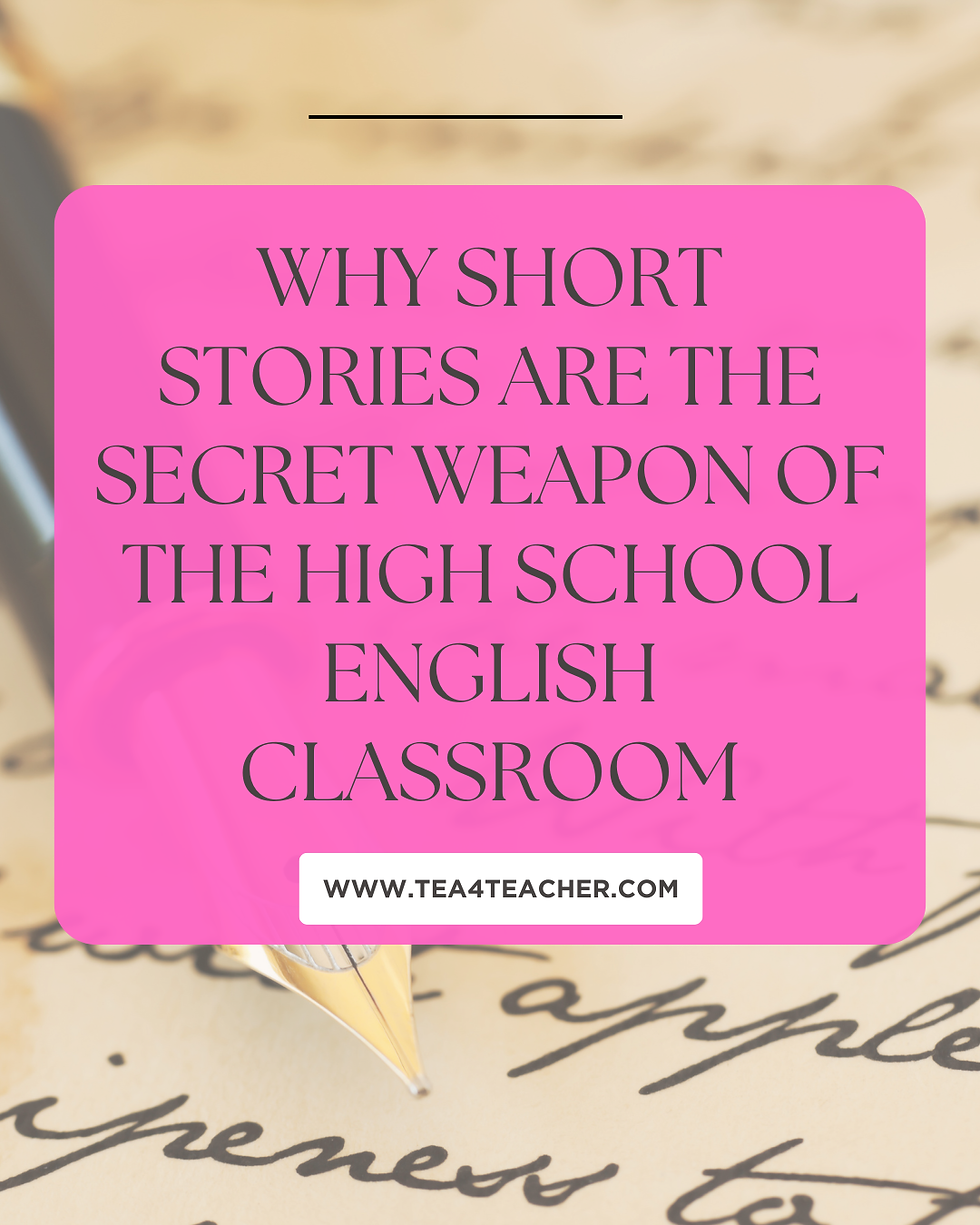Understanding Choices and Consequences — Exploring The Last Spin and The Chaser in the High School English Classroom
- Anna @ Tea4Teacher
- Oct 29, 2025
- 4 min read
Updated: Dec 30, 2025
High school students are constantly navigating new freedoms and responsibilities. They are testing boundaries, forming identities, and figuring out what kind of people they want to become. Literature can play a vital role in this process—especially stories that ask students to reflect on choices, consequences, and ethical dilemmas.
Two short stories that excel at this are Evan Hunter’s The Last Spin and John Collier’s The Chaser. Though vastly different in tone, both texts give students opportunities to examine human motivation, peer pressure, manipulation, and personal responsibility. These themes are not only deeply engaging for teens, but also crucial for building empathy and moral reasoning skills.
The Last Spin — Loyalty, Peer Pressure, and the Value of Human Life
In The Last Spin, two teenage gang members—Danny and Tigo—are ordered by their respective gangs to play Russian roulette to settle a turf dispute. Neither boy wants to be there. As they wait between turns, they talk about their lives, their families, and their dreams. By the time one of them is killed by the final bullet, they have formed a fragile but real friendship.
This story is short, fast-paced, and emotionally powerful—making it ideal for high school students. It opens the door to rich discussions about:
Peer pressure: Why do the boys agree to this deadly “game”? What pressures push them to prioritise loyalty over life?
Tribalism: How do arbitrary group boundaries dehumanise others? Could Danny and Tigo have been friends in another context?
Choice and responsibility: Do the boys have real agency, or are they trapped by their circumstances?
The value of human life: What does the story suggest about how easily young lives can be wasted?
Classroom strategies to deepen engagement might include:
Perspective journals: Students write diary entries from each boy’s point of view before and after the game, capturing shifting emotions.
Ethical debates: Students argue whether either boy should have refused to play, and what consequences that choice might have had.
Creative reimaginings: Students rewrite the ending with an alternative choice, exploring how small decisions can change lives.
These activities push students to look beyond the surface conflict and grapple with the underlying values, helping them build empathy and critical thinking skills.
The Chaser — Obsession, Consent, and Manipulation
John Collier’s The Chaser offers a very different tone—quiet, ironic, and unsettling. In it, a young man named Alan visits an old apothecary to purchase a “love potion” that will make a woman fall completely in love with him. The old man hints that once Alan grows tired of her clingy devotion, he may return for a much more expensive “chaser”—a subtle poison.
Though less dramatic than The Last Spin, this story provokes intense classroom discussion because it raises questions that are just as ethically thorny:
Consent and free will: Is love real if it is manufactured? Can you force someone to love you ethically?
Obsession and entitlement: What do Alan’s words reveal about how he views women and relationships?
Manipulation and moral blindness: Why does Alan ignore the old man’s dark hints? What does this suggest about self-deception?
Teaching strategies might include:
Close reading: Students highlight the old man’s euphemistic language and Alan’s naïve responses, analysing tone and subtext.
Role reversal writing: Students rewrite the story from the woman’s perspective after she unknowingly drinks the potion.
Ethics panel: Students role-play as ethicists advising Alan—should he be allowed to buy the potion? What harm could come from it?
Because the story is so compact and dialogue-driven, it’s also a great model for teaching subtext, foreshadowing, and irony.
Why These Stories Matter for Teenagers
Though they differ in genre, tone, and outcome, The Last Spin and The Chaser both explore what happens when people treat others as objects—whether as enemies or possessions.
This makes them ideal tools for helping teens:
Reflect on how values shape behaviour
Understand the dangers of dehumanising others
Recognise ethical grey areas rather than simplistic “right/wrong” binaries
Build perspective-taking by inhabiting multiple viewpoints
At a developmental stage where adolescents are defining their personal ethics and exploring complex relationships, these stories provide safe but powerful thought experiments. They let students wrestle with “what if” questions and examine how easily people can justify harmful choices.
Bringing These Stories to Life in Your Classroom
You don’t have to build a full unit from scratch to make these stories meaningful. The The Last Spin Short Story Unit for High School English is a ready-to-teach resource designed specifically to engage teens with this story’s themes of choice, peer pressure, and values.
This resource includes:
Pre-reading activities to hook students emotionally
Step-by-step comprehension questions
Analytical tasks on theme, tone, and characterisation
Critical thinking and debate prompts
Creative writing tasks for exploring alternative perspectives and endings
It saves you hours of planning time while ensuring students develop both literary analysis skills and personal reflection skills. The Chaser can be easily paired with this unit to extend your short story study and build thematic connections around ethics and consequences.
Building Empathy and Critical Thinkers
Ultimately, stories like The Last Spin and The Chaser are more than literature—they’re tools for building the ethical reasoning and emotional intelligence students need beyond school. By guiding teens to question motives, empathise with others, and reflect on values, we are equipping them for a world full of difficult choices.
Short stories provide the perfect compact, high-impact format for these conversations. In just a few pages, students can encounter lives vastly different from their own—and begin the lifelong work of becoming thoughtful, compassionate adults.
________________________________________________________________________________________________________
Check out my store today for tested, engaging High School English Resources that will save busy High School English teachers loads of time and energy. Save yourself time for tea (and also sani-tea, haha).




Comments